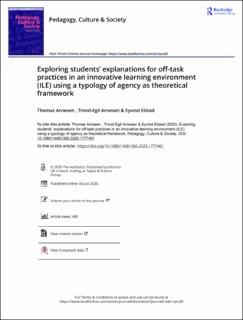Exploring students’ explanations for off-task practices in an innovative learning environment (ILE) using a typology of agency as theoretical framework
Peer reviewed, Journal article
Published version
Permanent lenke
https://hdl.handle.net/11250/2720186Utgivelsesdato
2020Metadata
Vis full innførselSamlinger
Originalversjon
Arnesen, T., Arnesen, T.-E., & Elstad, E. (2020). Exploring students’ explanations for off-task practices in an innovative learning environment (ILE) using a typology of agency as theoretical framework. Pedagogy, Culture & Society, 2020. 10.1080/14681366.2020.1777461Sammendrag
Learner agency is a key factor in success with technology-infused Innovative Learning Environments (ILEs). Focussing on informal practices unrelated to the learning agenda (off-task practices) and considered undesirable by students (school–net-conflict), this paper explores how students who experience a school–net-conflict explain their off-task practices using four conceptions of agency as a theoretical framework. An analysis of interview data from focus groups with a purposive sample of Norwegian secondary students suggests the dominance of sovereign conceptions of agency, i.e., off-task practices understood as individual self-regulation failures. Other common explanations included a) a drive-like ‘pull’ of social media (material conception), b) peers’ off-task practices as triggers (relational conception), and c) adjustment to a grade- and test-oriented incentive regime (ecological conception). Findings also suggest a disconnect between students’ explanations (situational nuance/detail) and attributions of ‘blame’ (dispositional default). Implications, limitations and further research are also considered.

